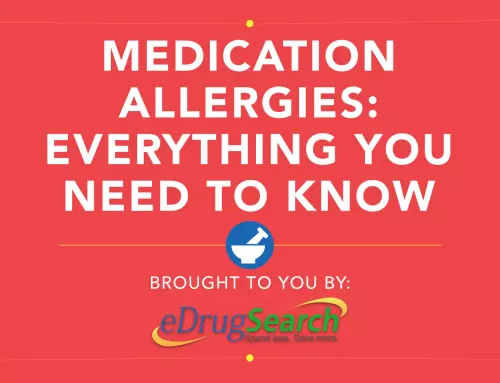If you’re looking to have a safer and healthier experience taking medication, here is a list of the top 10 “most important” tips for safe prescription drug use:
1) Keep An Updated Drug Worksheet
If you really want to understand your medications and desire to prevent any possible adverse drug reactions to what you take, there is no more important step than this. It’s especially needed if you’re going to a doctor you haven’t seen before and they don’t have your medical history. It’s done by gathering all of your medications together and taking them to your primary doctor so a drug worksheet can be made. Make sure you even include over-the-counter medications as well to keep your doctor abreast of any possible reaction.
Also list the reasons why you are taking that particular medication. You should never receive a new prescription without this list and all of the pertinent and up-to-date information. You won’t know the risk factors and if they are increase without having a good idea of what you’re already taking as well as their side-effects and which drugs have been known to clash with each other. If you have some issues filling out a prescription drug worksheet, you can speak with your pharmacist who will be more than happy to help. They will have on hand information about every drug request they fill and often give you pamphlets with corresponding facts, how the drugs work, and any possible side-effects.
Here is a quick explanation of the questions you will find on our free prescription drug worksheet:
- Drug name, who gave the prescription, and when they wrote it. The names should have both generic and brands listed. You should make sure to put down even other useful information such as any drugs, alcohol, tobacco, and over-the-counter medicines to help make the safest decisions possible.
- Give the purpose of the drug. There are numerous reasons why doctors do not always give a valid medical reason for the drugs they prescribe. It has been reported that one-fourth of all scripts given to patients do not have a purpose stated for why they were given. So it will be important to find that information and write it down. If you can find that there is no valid medical reason to take that drug, it will be best not to take it or risk harmful side-effects later on.
- Size of the dose, frequency, and duration. It’s extremely important to accurately detail the size of the dose you’ve been given and the frequency of which it was given. Not knowing this information can lead to overdose or if you don’t take enough, it can be largely ineffective and not treat the symptoms you’re facing.
- When you should finish taking the drug. Most drugs are not intended for continued use unless they are prescribed to treat a lifelong condition. In fact, they should be taken for as little time as possible and should only be taken during a certain time frame unless continued use is needed. Having a list will allow you reevaluate what you’re taking and even determine which drugs will no longer be needed.
- Possible side effects. Quite frequently, a lot of the side effects caused by medication is attributed to just ‘being old’. Things such as memory loss, depression, falling, and other situations that happen you may not be aware could be caused by your medication. If you have them listed out, then it’s easy for you, your doctor, or a family member to determine that maybe it wasn’t just an accident, but a side effect. As many as 37 percent of all documented medication issues were not reported to their doctor at the time, but later recognized as such.
- Possible interactions with food. Especially if you are on a specific diet, you will want to make sure you talk with your doctor and find out any possible interactions between your health, food, and your medications.
- Ways you take the drug. It’s best to always be honest with your doctor about your medications. If you’ve stopped, take more, or less than prescribed, he or she needs to know. Otherwise it will give them misconceptions about what is working and what isn’t. Honesty is the best policy.
- Get your family and friends on record. Have the people that you are closest to share how things may have changed since you started taking new medicine. You may not notice a change, especially if it’s gradual, but those around you probably will, especially if the medication interacts with your mood or thinking process.
- Fill out your drug worksheet. If you don’t have one click here to download and print off your free prescription drug worksheet pdf and fill it out so you can stay safe.
2) Determine If You Really Need Drug Therapy
If you were to really think about the most common medications and why they are prescribed, you would see a common thread. They are often given for situations that are only situational and last just a short amount of time. For example, depression is a commonly treated condition but may last just for a short stretch. The best thing to do is try to approach the situation as naturally as possible. A lot of conditions can be treated without the help of medication. So rather than running to your doctor, research better ways to handle the symptoms. The best policy for sure is to use as few drugs as possible and to use them properly.
3) Always Start Off With Lower Doses
In most situations, it takes time to build up medication levels in the blood before you see any results. It’s a process where you start small and on low doses and build your way from there. The lower the dose, the less the side affects you will feel. If you are elderly or managing the medications of someone who is, it’s suggested that you go with one-third dose. You would then increase the dosage as needed, but hopefully that will be enough to get you through.
4) See If You Can Stop Taking a Drug
One of the best ways to prevent drug interactions is to see if you can stop taking one medication. It gives you and your doctor a change to go over your medication list and decide if there are some that can be discontinued or even changed up. This would also be the case if you are trying to remove a certain drug from your system and you are attempting to wean yourself off, going gradually with lower doses.
5) Stopping a Medication
Take the time to regularly review the medication lists to decide if there are any that can be removed from the list. As stated above, not all medications should be taken on a constant basis. Drugs like antibiotics and antidepressants should be evaluated at an interval of every 3 to 6 months to make sure you still need them. Prolonged exposure can add to even more issues developing. Other drugs require a slow weaning off period, so it’s important to check with your doctor before discontinuing any medications, as well as seeing if you can lower the dose if the condition has improved enough to do so. There are a few exceptions, like antibiotics as you should continue taking those as prescribed, even if you are beginning to feel better.
6) Determine If You Are Experiencing Side Effects
As stated above, you should always ask yourself if you actually need the drug that’s being suggested to you. Know all the possible side effects before taking it and ask if a lower dose is available. This will ensure that if there are any side effects, they will be minimal. But there are times when adverse reactions do happen and we may not always catch it. Below is a list of the most common effects people report while taking medications:
- Nervous system issues, including uncontrollable movement in the arms, legs, and face, falling, dizziness, vehicle accidents from the sedative effects of many medicines, and sexual dysfunction.
- Metal issues like depression, confusion, memory loss, delirium, hallucinations, and trouble sleeping.
- Urinary troubles that including struggling to urinate or incontinence.
- Gastrointestinal reactions, such as vomiting, bleeding, constipation, lack of desire to eat, nausea, and diarrhea.
It’s important to contact your doctor if you or anyone you know has developed these conditions after starting a new medication regimen. You can also do an online search for the drug to search for any possible side effects and compare them to any changed conditions you might start to feel. Definitely keep watch over what you’re taking, know all the possible side effects, determine if it’s worth taking and research other, more natural approaches before starting something that could potentially make you feel more ill.
7) Make Assumptions About the Medications
If you begin to feel or act differently after starting a medication, it’s best to assume that maybe it’s the drug that’s causing you to feel that way. The best course of action then is to not wait and see if it gets worse or goes away. Immediately call your doctor and share with them any changes, no matter how small. Even the smallest of issues could be the first sign that something major is starting to happen and you’d want to catch that early.
8) Ask Plenty of Questions
Before you leave your doctor’s office, make sure you have all your ducks in a row and there’s no leaving anything to chance. Know exactly the plan he or she wants you to be on, for how long, the side of the dose, and how often you are to take it. Be sure to also alert someone close to you of the medication change and the potential side effects to make sure they can spot signs you may not be able to. It doesn’t matter how young or old someone is, there is a great chance of medications causing negative problems with your health. That’s why it’s important let someone else close to you know about it and how best to react if the worst happens. Even things like memory loss can be a major influence in causing damage to your body as you may forget you already took your medicine and could overdose. All information printed on the labels should be written out, as well as what to do in case of an emergency.
9) Removing Old Drugs
Even when people return to optimum health, they are often tempted to keep and later reuse the same medication at a later date. In other cases, people will share the last of their medications with other people they think might be helpful. For example, giving someone antibiotics who you think might benefit. Taking the same drugs later on or sharing the medications with other people pose a major health risk as new drugs will often react with the older drugs. Sharing drugs can put your friend or family member in risk, especially if they have an allergy to certain medications you are unaware of but is most likely listed in their medical report. Be sure to always throw away all remaining medications once you are finished with them.
10) Make Sure Your Main Doctor Knows Everything
A lot of times, our primary doctor will refer you to a specialist for more specialized care. But what can happen is a lack of communication on their parts. Your primary doctor may not have any idea what kinds of medicine you were given by the specialist and neither will the specialist know what you’re already taking. So make sure you take your list of drugs with you whenever you see a new doctor so they can cross-reference what you’re on and if those meds need to updated or removed. In the same light, check with your primary doctor first on all additions or changes to make sure they are on the same page. Your primary doctor will know more of your history than the specialist. Check with the pharmacist as well, as they are experts on medications and can easily help you determine if different drugs prescribed by different doctors will cause any issues when taken together.
Do You Have Any Tips for Safe Prescription Drug Use?
If so, I would love to get your feedback. Please share them with us below.













Leave a Reply